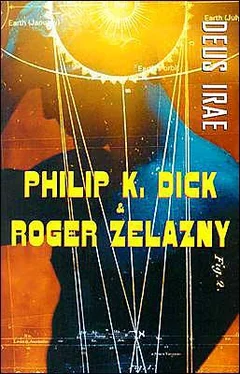She did not disengage her hands. But she remained inert, so passive that he felt as if he held deceased organisms; the physical sensation repelled him and he voluntarily released her. She then picked up her coffee cup once more, with tranquility. And she said, “All right; we know that a Carleton Lufteufel, Chairman of the ERDA of the United States Government, existed. But he was a man. Not a god.”
“A man in form,” Father Handy said, “made by God. In God’s image, according to your own sacred writ.”
She became silent; this she could not answer.
“Dear,” Father Handy said, “to believe in the Old Church is to flee. To try to escape the present. We, our church; we try to live in this world and face what’s happening and how we stand. We’re honest. We, as living creatures, are in the hands of a merciless and angry deity and will be until death wipes us from the slate of his records. If perhaps one could believe in a god of death… but unfortunately—”
“Maybe there is one,” Lurine said abruptly.
“Pluto?” He laughed.
“Maybe God releases us from our torment,” she answered steadily. “And I may find him in Abernathy’s church. Anyhow—” She glanced up, flushed and small and determined and lovely. “I won’t worship a psychotic ex-official of the U.S. ERDA as a deity; that’s not being realistic; that’s—” She gestured. “It’s wrong,” she said, as if speaking to herself, trying to convince herself.
“But,” Father Handy said, “he lives.”
She stared at him, sadly, and very troubled.
“We,” he continued, “as you know, are painting him. And we are sending our inc, our artist, to seek him out; we have Richfield Station and AAA maps… call it pragmatism, if you want; Abernathy once said that to me. But what does he worship? Not anything. You show me. Show me.” He slammed his flat hand on the table, savagely.
“Well,” Lurine said, “maybe this is—”
“The prelude? To the real life to come? Do you genuinely believe that? Listen, dear; St. Paul believed that Christ would return in his own lifetime. That the ‘New Kingdom’ would begin in the first century A.D. Did it?”
“No,” she said.
“And everything that Paul wrote or thought is based on that fallacy. But we base our beliefs on no fallacy; we know that Carleton Lufteufel served as the manifestation on Earth of the Deity, and he showed his true character, and it was wrathful. You can see it in every handful of dirt and rubble. You’ve seen it for sixteen years. If there were any psychiatrists alive they’d tell you the truth, what you’re trying to do. It’s called—a fugue.” He became silent, then.
Ely added, “And she gets to sleep with Sands.”
No one said anything to that; it, too, consisted of a fact. And a fact was a thing, and words could not retort to a thing: it required another and greater thing. And Lurine Rae, and the Old Church, did not have that; it possessed only nice words like “agape” and “caritas” and “mercy” and “salvation.”
“When you have lived through the ter-weps,” Father Handy said to Lurine, “and the gob, you no longer can live by words alone. See?”
Lurine nodded, troubled and confused and unhappy.
During the war many toxic drugs had been developed, and afterward, these drugs—a vast variety of kinds—lay about amid the general chaos and could be found here and there like everything else. And Peter Sands took particular interest in these drugs, because some—a few, anyhow—of them, although developed originally as weapons against the enemy, to impede, disorient, and altogether befuddle his faculties, had a certain positive value.
At least so he believed. If one was careful, one could concoct a potion, several drugs taken in conjunction; one became disoriented, but a certain expansion or heightened lucidity also occurred. Green little methamphets, shiny red ‘zines, white flat discs of code segmented sometimes into halves, sometimes when stronger into four parts, tiny yellow elves… he had gathered an inventory which he carefully kept hidden. No one but himself knew of this trove which he hoarded… and, while collecting and hoarding, he experimented.
He believed that the so-called hallucinations caused by some of these drugs (with emphasis, he continually reminded himself, on the word “some”) were not hallucinations at all, but perceptions of other zones of reality. Some of them were frightening; some appeared lovely.
Oddly, he poked and tinkered with the former; perhaps a long Puritan background had made him—he conjectured—masochistic; anyhow, it was into the realm of terror that he liked to venture very slightly… he did not wish either to go too far or to stay too long, but he wished for a fair glimpse.
It reminded him of his dad, who, one day before the war at an amusement park, had tried out a shock machine; you put in a dime, seized two handles, and gradually moved them apart. The farther apart, the greater the electric current; one learned just how much he could stand, how far apart he could bear to pry the two handles. Watching his sweating, red-faced father, Peter Sands had felt admiration, had seen his dad’s grip on the handles become tighter, more vigorous, the greater the gap became. And yet it was obviously a powerful—too powerful, ultimately—antagonist which his father strove against; finally his father had, with a grunt of pain, let go entirely.
But how admirable his dad had been, and of course he was showing off to Pete, who, at eight years old, thought his dad was great indeed. Himself, he had for one fraction of a second touched the handles—and leaped away in fright; he could not endure an instant of the shock. He was, indeed, not like his dad… at least in his own estimation.
So now he had his leftover ter-wep pills. Which he mixed, alchemist-wise, in proportions of a guarded variety and quantity. And always he made sure that another person was present, so that a standard phenothiazine could be given orally, if he passed too far in, out, down, whatever direction the drugs carried one.
“I’m nuts,” he had said to Lurine Rae, once, in candid admission. And yet he kept on; he inspected the offerings of each peddler who passed through Charlottesville… inspected and often bought. He owned vast pharmacopoeias and could tell, usually at a glance, what a given pill, tablet, or spansule consisted of, no matter how arcane; he recognized the hallmark of every prewar ethical house: in this his wisdom was complete.
“Then,” Lurine had said, “stop.”
But he didn’t want to, because he was seeking something. Not just diddling himself but searching—the goal was there, but obscured by a membrane; and he strove, via the medication, to lift the membrane, the curtain—this was how he depicted it to himself, a rationalization, perhaps, but why else do this? Because often he did suffer fear and disorientation, sometimes depression and even, but rarely, murderous polymorphic rage.
Punishment? No, he had often thought and replied. He did not seek to injure himself, to impair his faculties, to develop liver or kidney toxicity; he read brochures, carefully watched for side effects… and certainly he did not want to turn berserk and injure another; pale, pretty Lurine, for example. But—
“We can see Carleton Lufteufel with our unaided senses,” he explained to Lurine. “But I believe—” There was another order of reality and the unaided eyes did not penetrate this; if you took ultraviolet and infrared rays as an example…
Lurine, curled up in a chair opposite him, smoking an Algerian briar pipe with a prewar utterly dried-out Dutch cavendish mixture in it, said, “Instead of taking pills, build instruments that register its presence. Whatever it is you’re after. Read it off a dial. That’s safer.” Always she was afraid that he would enter a drug-induced state and not return; after all, the medications were not medications: they were neurological and metabolic enzymes, poorly understood even by their makers… their effects varied from person to person.
Читать дальше








